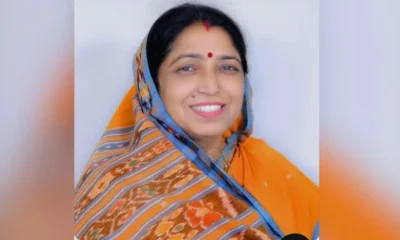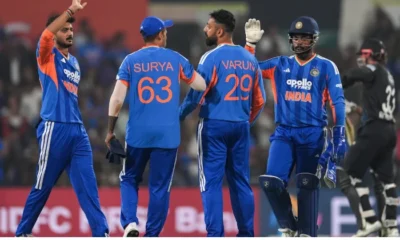India News
President hails demonetisation, GST in his first Independence Day Speech; asks citizens to help Govt make new India
Published
9 years agoon
By

[vc_row][vc_column][vc_column_text]As India celebrates 70 years of independence tomorrow, President Ram Nath Kovind, in his first speech Independence Day eve speech after being sworn in last month, talked about the importance of caring and of sharing, and of inter-dependence in society. He stressed upon the need for partnership between citizens and government, of the need for citizens to help build a law-abiding society and achieve the goals of a New India.
He said while the government is implementing GST to eliminate multiple taxes and simplify transactions, “it is for each of us to make this an essential part of our everyday transactions and business culture.” “I am happy that the transition to the GST system has been smooth,” he added.
“In the year 2022, our country will complete 75 years of Independence. It is our national resolve to attain certain desired milestones for a New India by then,” he said, outlining what he meant by New India: “There are some obvious parameters – like a house for every family, power on demand, better roads and telecom, a modern railway network, rapid and sustained growth.
“New India must be a society rushing towards the future, but also a compassionate society. A compassionate society where the traditionally disadvantaged, whether SCs, STs or OBCs, are part of our national developmental process. I am confident that a strong partnership between citizens and the government will allow us to meet the goals of New India… Poverty and New India are simply not compatible.”
He spoke of demonetisation and appreciated the people’s “immense patience and understanding in the days following demonetisation” and their “whole-hearted support in the battle against corruption and black money”.
He said demonetisation has boosted efforts to build an honest society and “this spirit and this momentum” must be sustained.
Here is the full text of the President’s speech:
Dear Fellow Citizens engaged in the task of nation building
My greetings to you as we complete 70 years of our Independence
Our country will be celebrating its 71st Independence Day tomorrow. On the eve of this anniversary I extend my good wishes to all of you.
On August 15, 1947, we became a free nation. Sovereignty and the responsibility for our destiny moved from the British crown to the people of India. Some have called this process a “transfer of power”.
It was much more than that. It was the culmination of a dream for our country – a dream seen by our forefathers and freedom fighters. We were free to imagine and build our nation anew.
It is crucial to understand that this dream for a free India was rooted in our ordinary villages, in the well-being of our poor and underprivileged, and in the all-round development of our country.
For this we owe so much to the countless freedom fighters who made great sacrifices to bring us here.
Chennamma, the Rani of Kittur. Lakshmibai of Jhansi. Matangini Hazra, the heroine and martyr of the Quit India Movement. There are so many examples.
Matangini Hazra was an elderly woman, into her 70s. She was shot by the colonial police in Tamluk, in Bengal, while leading a peaceful protest march. She died with “Vande Mataram” on her lips and with the hope of a free India in her heart.
Freedom fighters like Sardar Bhagat Singh, Chandrashekhar Azad, Ram Prasad Bismil, Ashfaqullah Khan, Birsa Munda and thousands of others gave their lives for us. We can never forget them.
From the earliest days of our freedom struggle, we were blessed with a galaxy of revolutionary leaders who guided our country.
They spoke of not just political freedom. Mahatma Gandhi emphasised the moral character of India and of Indian society. The principles that Gandhiji spoke about are relevant even today.
Gandhiji was not alone in this nationwide struggle for freedom and reform. Netaji Subhas Chandra Bose exhorted our people, saying: “Give me blood and I will give you freedom”. At his word, millions of Indians joined the freedom movement under his leadership and gave their all.
Nehruji emphasised that India’s age-old heritage and traditions – so dear to us – could co-exist with technology and a quest to modernise our society.
Sardar Patel instilled in us the importance of national unity and integrity. And of a disciplined national character.
Babasaheb Bhim Rao Ambedkar urged upon us the virtues of constitutional governance, of the rule of law – and of the vital need for education.
I have given only a few examples of illustrious leaders. I could give you many more. The generation that brought us to freedom was diverse. They were men and women who represented all parts of our country and a variety of political and social thought.
We need to draw inspiration from such brave freedom fighters, many of whom sacrificed even their lives for the country. We need to invoke the same spirit today in the task of nation building.
The stress on the moral basis of policy and action, belief in unity and discipline, faith in a synthesis of heritage and science, and promotion of the rule of law and of education – all of it was located in a partnership between citizen and government.
That is how our nation has been built – by a partnership between citizen and government, between individual and society, between a family and the wider community.
Fellow Citizens
A tradition I remember from my childhood was that when there was a wedding in any one family, the entire village shared the responsibility and contributed. Regardless of the caste or community, the bride became the daughter of not just a single family but of the entire village.
Neighbours and others living in the village looked after guests, and took charge of different arrangements. Contributions came from many families. One family would send food-grains for the wedding, another would send vegetables, a third would arrive with some other item.
There was a sense of caring and of sharing, and of interdependence. If you helped your neighbours in their times of need, they instinctively helped you in turn.
Today, in big cities we may not even know our neighbours. Whether in cities or villages, it is important to renew that sense of caring and sharing. This will make us a gentler and happier society and help us understand each other with greater empathy.
Fellow Citizens
This spirit of empathy and of social service and volunteerism is very much alive in India. There are so many people and organisations that work quietly and diligently for the poor and the disadvantaged.
They could be running schools for street children, caring for stray animals and birds, and providing water to hard-to-reach tribal communities in remote areas. Or cleaning rivers and public places. They are nation builders in action, and we need to draw inspiration from them.
We should also work with unity and purpose to ensure that the benefits of government policies reach all sections of society. For this, the partnership between citizens and government remains essential:
- The government has started the Swachchh Bharat campaign – but it is for each of us to ensure a Swachchh Bharat
- The government is building toilets or helping build toilets – but it is for each of us to use those toilets and make India open-defecation free
- The government is enabling communication infrastructure – but it is for each of us to use the Internet for the right purposes: to bridge knowledge gaps, create opportunities, and enhance educational and information access
- The government is promoting the idea of Beti Bachao–Beti Padhao – but it is for each of us to ensure that our daughters are not discriminated against and get the best education
- The government can frame laws and strengthen law enforcement – but it is for each of us to be a law-abiding citizen. And to build a law-abiding society
- The government is pushing transparency and eliminating corruption in public recruitment and procurement – but it is for each of us to answer to our inner conscience in everyday life
- The government is implementing GST to eliminate multiple taxes and simplify transactions – but it is for each of us to make this an essential part of our everyday transactions and business culture
I am happy that the transition to the GST system has been smooth. It should be a matter of pride for all of us that the taxes we pay are used for nation building – to help the poor and the marginalised, to build rural and urban infrastructure, and to strengthen our border defences.
Fellow Citizens
In the year 2022, our country will complete 75 years of Independence. It is our national resolve to attain certain desired milestones for a New India by then.
When we speak of a New India, what do we mean? There are some obvious parameters – like a house for every family, power on demand, better roads and telecom, a modern railway network, rapid and sustained growth.
And yet there is more. New India must include that integral humanist component that is in our DNA, and which has defined our country and our civilisation. New India must be a society rushing towards the future, but also a compassionate society.
- A compassionate society where the traditionally disadvantaged, whether SCs, STs or OBCs, are part of our national developmental process
- A compassionate society where populations in our frontier areas and states, who may sometimes feel a sense of alienation, are embraced as our brothers and sisters
- A compassionate society where the deprived child, the aged and the ailing senior citizen, and the poor and the under-privileged are always in our thought – not an afterthought. And where we take special care to ensure that our divyang brothers and sisters get equal opportunities in all walks of life
- A compassionate and egalitarian society that does not discriminate on gender or religious background
- A compassionate society that enriches our human capital and equips our young people by promoting accessible, affordable and world-class educational institutions. And where quality health-care and nutrition are not a challenge
It is only with all this that we will build the New India we can cherish – where every Indian is equipped to fulfil his or her potential and do so in a manner that leaves each one of us content and happy. And helps each of us contribute to society and our country.
I am confident that a strong partnership between citizens and the government will allow us to meet the goals of New India.
Your immense patience and understanding in the days following demonetisation – and your whole-hearted support in the battle against corruption and black money – reflected a responsible and enlightened society.
Demonetisation has boosted our efforts to build an honest society. We must sustain this spirit and this momentum.
Fellow Citizens
There is also need to adopt technology. We must use technology to empower our people and achieve the goal of poverty elimination in a single generation. Poverty and New India are simply not compatible.
Today, the world is looking at India with admiration. Our country is seen as a responsible global citizen, a growing economy, and a solution provider to various international challenges – such as climate change, disasters, conflicts, humanitarian crises, radicalism and terrorism.
The Tokyo Olympics of 2020 offer another opportunity for us to raise our standing in the world’s eyes. Over the coming three years, we should absorb ourselves in this national mission. Government agencies, sports bodies and business enterprises need to join hands to identify and support our talented sportspersons and provide them world-class training facilities – so that they can be even more successful in Tokyo.
As citizens and children of India – whether we live at home or abroad – we must ask ourselves how we can add to our country’s pride.
Fellow Citizens
It is natural for us to think of our families, but we must also think of society. We must heed the call for that extra degree of selflessness, that extra something beyond just duty. A mother who nurtures and brings up her child is not just doing a duty. She is displaying a unique selflessness.
- Our soldiers who guard our borders, on a hot day in the desert or high up on a cold mountain, are not just doing their duty. They are displaying an extra degree of selflessness
- Our police and paramilitary forces that brave death to combat terrorism or crime and keep us safe are not just doing their duty. They are displaying an extra degree of selflessness
- Our farmers who labour under extremely tough conditions to grow food to feed fellow Indians whom they have never met, and who live in the other corner of the country, are not just doing a job. They are displaying an extra degree of selflessness
- After natural disasters, so many motivated people, civil society groups and public agencies work day-and-night in rescue and relief operations. They display an extra degree of selflessness
Can each of us not imbibe this spirit of selflessness?
We can and we have.
On an appeal from the Prime Minister, more than one crore families voluntarily gave up their LPG fuel subsidy – so that a gas cylinder could reach the kitchen of a poorer family of fellow Indians. And so that members of that family, particularly women, were saved from smoke from chulhas that damaged their eyes and lungs.
I salute those families that gave up their subsidy. No law or government order made them do what they did. Their response came from within.
We should draw inspiration from these families. Each of us must find a way to give back to society. Each of us must choose one thing we can do to help another, less-fortunate Indian.
The single most critical factor for building our nation is to equip our coming generation. We need to ensure that not one child is left behind. As such I would urge you, as fellow nation builders, to help educate less-privileged children in our society. Help teach a child other than your own. Enrol and pay the school fees or buy the books of at least one child other than your own. Just one!
Our India is at the door of great achievements. In a few years, we will become a fully literate society. We must set the bar higher, and aim to become a fully educated society.
We are all stake-holders in this mission. If we achieve it, our country will change before our eyes. And we will become agents of this defining change.
Two thousand five hundred years ago Gautam Buddha said, “अप्पदीपोभव … Be a lamp unto yourself …” If we follow his teachings, acting together, with the passion of our freedom movement, we can collectively be the 125 crore lamps that light up the path to a New India.
Once more, I wish all of you the very best on the eve of our 71st Independence Day.
Jai Hind, Vande Matram[/vc_column_text][/vc_column][/vc_row]
You may like
-


Lok Sabha clears bill to levy cess on pan masala and similar goods for health, security funding
-


Congress says US President Donald Trump threatening existence of GST, questions PM Modi’s stance
-
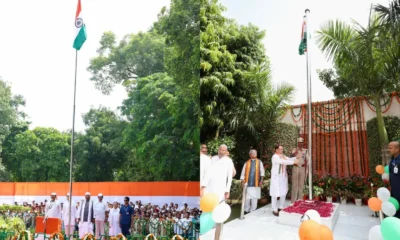

Independence Day 2024: Mallikarjun Kharge, J P Nadda, others hoist national flag as India celebrate freedom
-
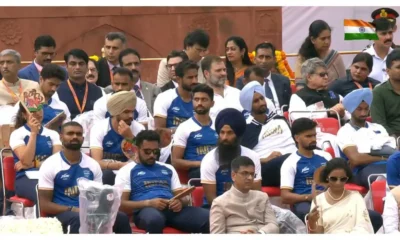

Rahul Gandhi attends 78th Independence Day celebrations at Red Fort as Leader of Opposition
-
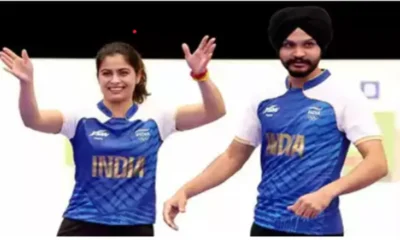

Manu Bhaker wins Olympics bronze in 10m air pistol with Sarabjot Singh in mixed team event, has 2 medals, matches 1900 record
-
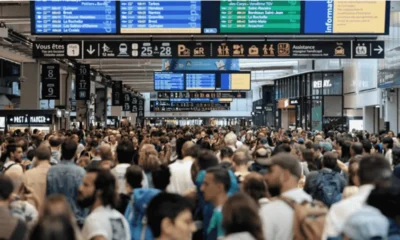

French high-speed rail network targeted in major attack as Olympics kick off
India News
BJP nominates Laxmi Verma to Rajya Sabha from Chhattisgarh
The BJP has announced Laxmi Verma as its Rajya Sabha nominee from Chhattisgarh, with her election considered certain given the party’s Assembly strength.
Published
1 day agoon
March 3, 2026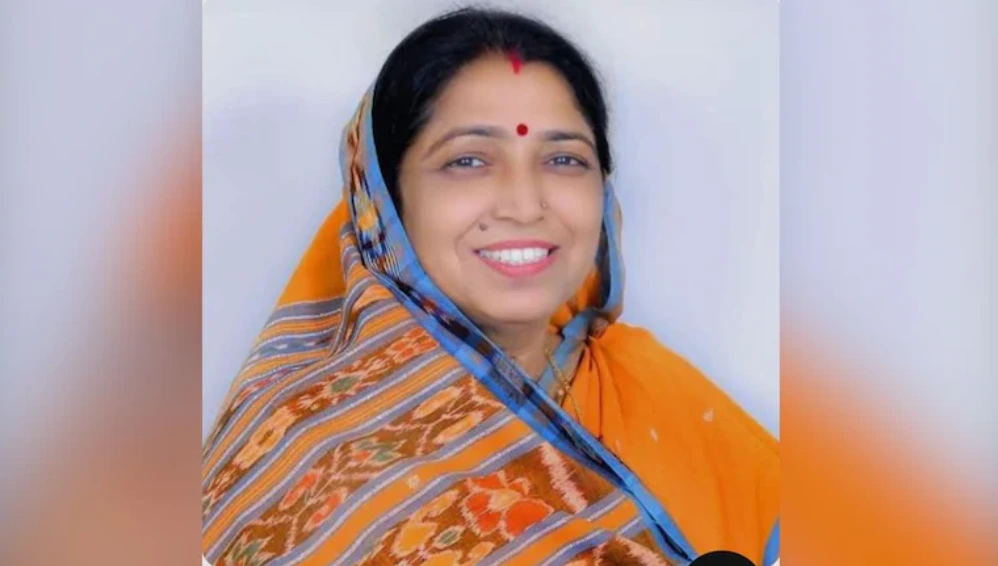
The Bharatiya Janata Party (BJP) has announced Laxmi Verma as its candidate for the Rajya Sabha from Chhattisgarh, naming her as part of a broader list of nominees released for six states. The decision comes after weeks of internal consultations and is being viewed as backing the preference of Chief Minister Vishnu Dev Sai.
Party deliberations and final selection
According to party sources, seven names were initially considered before the list was narrowed to three — Laxmi Verma, Narayan Chandel and Krishnamurthy Bandhi. After discussions at the central level, the BJP leadership finalised Verma’s candidature.
Verma, 55, hails from Mudpar village in Simga block of Balodabazar district. She has been associated with the BJP since 1990, beginning as a primary member and gradually rising through the organisational ranks.
Long association with BJP and public roles
Her political journey includes serving as the representative of Raipur MP Ramesh Bais in 2000. In 2001, she was elected to the BJP Mahila Morcha Working Committee, a role she held for four years.
Between 2010 and 2014, Verma was part of the National Working Committee of the BJP Panchayati Raj Cell. She also remained a member of the BJP Mahila Morcha Working Committee from 2010 to 2022. From 2021 to 2025, she served as State Vice President of the BJP in Chhattisgarh. During this period, she was entrusted with responsibilities as Gariaband organisation in-charge and BJP media spokesperson between 2021 and 2024.
Verma’s public life began in 1994 when she was elected councillor from Ward No. 7 of the Raipur Municipal Corporation. In 2010, she became president of the Raipur District Panchayat. Since October 7, 2024, she has been serving as a member of the Chhattisgarh State Women’s Commission.
Social and community engagement
Apart from party responsibilities, Verma has been active in several social organisations. She became president of Shakti Mahila Manch, Raipur, in 1998 and received the District Youth Award from Nehru Yuva Kendra, Raipur, in 1999.
She has also been associated with the Labor Rehabilitation Committee in Raipur and has served as Chief Patron of the Chhattisgarh Ekta Mazdoor Kalyan Sangh since 2009. Since 2011, she has been an advisory member of the Family Court, Raipur. Additionally, she has held positions in the All India Panchayat Parishad and the Chhattisgarh Scout Guides.
Verma is regarded as an influential figure within the Manwa Kurmi community and currently serves as National General Secretary of the All India Kurmi Kshatriya Mahasabha Women’s Wing.
Rajya Sabha arithmetic
Chhattisgarh presently has five members in the Rajya Sabha. Two seats, currently held by Congress leaders Phoolodevi Netam and KTS Tulsi, are set to fall vacant on April 9, 2026. Two other Congress MPs — Rajiv Shukla and Ranjeet Ranjan — have terms lasting until June 29, 2028. BJP leader Devendra Pratap Singh will continue in office until April 2, 2030.
With 90 MLAs in the Chhattisgarh Assembly and two Rajya Sabha seats going to polls, the winning quota is calculated at 31 first-preference votes. Given the BJP’s current strength in the Assembly, Verma’s election is widely seen as certain once voting is held.
India News
Total lunar eclipse on March 3: When and how to watch blood moon safely
A total lunar eclipse on March 3 will create a stunning blood moon. Here are the timings, visibility details and safe viewing tips for India and other regions.
Published
1 day agoon
March 3, 2026
Sky-watchers across several parts of the world are set to witness a spectacular total lunar eclipse on March 3, when the Moon will take on a striking coppery-red hue, popularly known as a “blood moon”.
A total lunar eclipse occurs when the Earth moves directly between the Sun and the Moon, casting its shadow completely over the lunar surface. During this phase, instead of turning dark, the Moon glows in shades of deep red or orange. This phenomenon happens because the Earth’s atmosphere bends and filters sunlight, allowing only red wavelengths to reach the Moon.
Where will the lunar eclipse be visible
The total lunar eclipse will be visible across eastern Asia, Australia, New Zealand, the Pacific region, and parts of North and South America.
In India, only the final phase of the eclipse will be visible around moonrise at sunset. Northeastern states including Assam, Arunachal Pradesh, Meghalaya and West Bengal are expected to have a view of the celestial event, subject to clear weather conditions.
According to official timings shared by the India Meteorological Department, the eclipse schedule in India is as follows:
- Eclipse begins: 3:20 pm
- Total phase begins: 4:34 pm
- Total phase ends: 5:33 pm
- Eclipse ends: 6:48 pm
Globally, totality will last for approximately 58 minutes, from 6:04 am EST (1104 GMT / 4:34 pm IST) to 7:02 am EST (1202 GMT / 5:32 pm IST).
Is it safe to watch the blood moon
Unlike a solar eclipse, a lunar eclipse is completely safe to observe with the naked eye. There is no need for protective eyewear.
Experts advise choosing a location with a clear and unobstructed view of the eastern horizon for the best experience. While the eclipse can be seen without equipment, binoculars or a small telescope can enhance the view and bring out the Moon’s reddish tones more clearly.
Tips for photographing the blood moon
Those planning to capture the rare event can consider the following tips:
- Use a DSLR or mirrorless camera paired with a telephoto lens between 200 mm and 600 mm for closer shots.
- Increase the ISO between 400 and 1600 and slow the shutter speed to around 1–2 seconds during totality to capture the dimmer red glow.
- Use a tripod to ensure stability and avoid blurred images.
The March 3 total lunar eclipse offers astronomy enthusiasts a unique opportunity to witness one of the most captivating natural spectacles in the night sky.
India News
PM Modi to review ministry reforms in next cabinet meeting, ministers asked to submit impact report
PM Narendra Modi will review major reforms undertaken by ministries since the formation of the government in June 2024, with ministers directed to submit a two-page impact report.
Published
1 day agoon
March 3, 2026
Prime Minister Narendra Modi is set to review the key reforms undertaken by various ministries since the formation of the government for a third term in June 2024. Ministers have been directed to submit a concise report highlighting the most significant changes introduced by their departments and their measurable impact.
According to sources, the Prime Minister wants to assess reforms that have directly improved the lives of citizens and enhanced the ease of doing business in the country.
Ministers asked to list three major reforms
During his first cabinet meeting on February 24 at Seva Tirtha, the Prime Minister instructed all ministers to prepare a list of major reforms carried out by their respective ministries. The Cabinet Secretary subsequently circulated a standard format for submissions.
Each ministry has been asked to identify three key reforms along with their impact, summarised within a two-page document. The reports are expected to be presented at the next cabinet meeting, which is likely to take place this week.
Sources said ministries are currently working at a rapid pace to compile the required details.
Focus on sector-specific achievements
Officials indicated that several ministries are preparing to highlight notable policy interventions and administrative measures undertaken since June 2024.
A senior official from the Ministry of Consumer Affairs said the department has implemented reforms aimed at simplifying processes for consumers and businesses. These include changes in legal metrology and quality control frameworks.
The Home Ministry is expected to outline progress in its campaign against Naxalism and steps taken towards modernising the police force.
The Defence Ministry may present updates related to production policy and incentive schemes designed to strengthen self-reliance in the sector. Measures focusing on artificial intelligence and quantum technology are also likely to be part of the discussion.
Sources added that the Ministry of Jal Shakti has moved to decriminalise minor violations under the Water Pollution Act, a step aimed at promoting ease of doing business.
Meanwhile, the Ministry of Road Transport is expected to highlight the implementation of a satellite-based toll system and revised FASTag rules to simplify travel and improve compliance.
Push for accountability under Modi 3.0
Sources said the government views this review exercise as a way to increase accountability and directly evaluate the tangible outcomes of reform initiatives. The move is being seen as part of efforts to accelerate the reform agenda under the third term of the Modi government.

BJP nominates Laxmi Verma to Rajya Sabha from Chhattisgarh

ICC Men’s T20 World Cup: Who advances if India vs England semifinal is washed out

Happy Holi 2026 wishes and messages to share with your loved ones

Total lunar eclipse on March 3: When and how to watch blood moon safely



